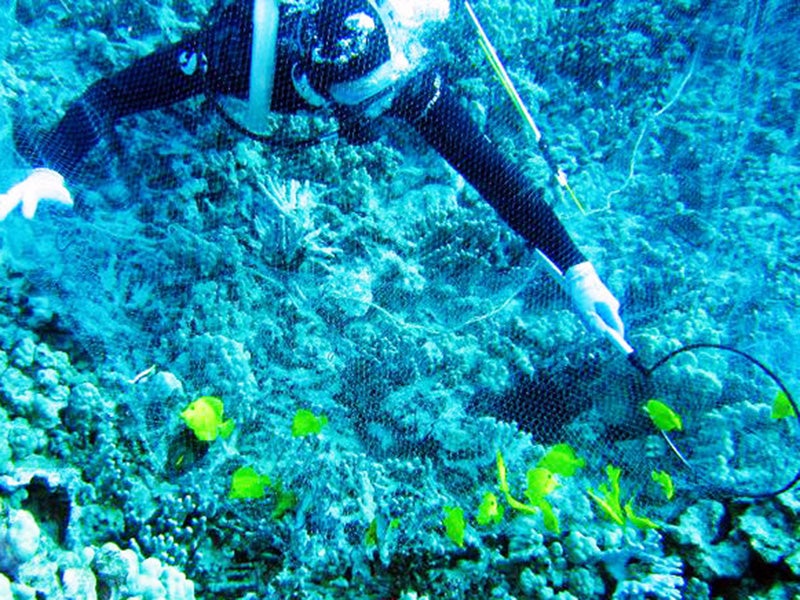The Latest on Commercial Aquarium Collection in Hawai‘i
We’ve been working with reef advocates and Native Hawaiian cultural practitioners for 13 years to challenge commercial aquarium collection in court and before the state. We’ll keep at it until Hawai‘i’s reef ecosystems can thrive for generations to come.
This piece was updated in November 2025 with developments since its original publication in October 2024.
Hawai‘i communities have long opposed collection of wild reef fish for the aquarium pet trade. Commercial collectors target juvenile indigenous and endemic fish species, including species that feed local communities, chasing schools and individuals into fine-meshed nets where they cannot escape. The fish are then bagged, shipped, and sold to pet stores around the world. Evidence suggests that most fish captured for home aquariums die within the first year of captivity. Left in the wild, these species would live much longer. In some cases, like the Yellow Tang, these species can live more than 40 years. Due to its harmful effects on fish populations, reef ecosystems, and other community needs, Earthjustice has been representing community groups for over a decade to challenge the harmful practice of commercial aquarium collection in court.
What is the Status of Commercial Aquarium Collection in Hawai‘i?
Because of our Hawai‘i Supreme Court victory in the Umberger case back in 2017, commercial aquarium collection in Hawai‘i is prohibited without first completing a two-step process: (1) conducting environmental review under the Hawai‘i Environmental Policy Act, and then (2) obtaining the relevant permits from the Hawai‘i Board of Land and Natural Resources. The aquarium pet industry has begun — but not yet completed — this process for West Hawai‘i Island and O‘ahu. Thus, commercial aquarium collection remains illegal across Hawai‘i at this time.
But the industry isn’t backing down. It continues to press forward in the hopes of resuming its decades-long practice of extracting hundreds of thousands of native reef fish from Hawai‘i’s reefs each year, at the expense of Hawai‘i’s reef ecosystems and Native Hawaiian cultural practices.
West Hawai‘i
The aquarium pet industry has finished the environmental review process to seek up to seven commercial aquarium permits for collection in West Hawai‘i. By a 4-1 majority, the Hawai‘i Supreme Court ruled that the industry’s West Hawai‘i environmental impact statement was legally valid.
However, the Board of Land and Natural Resources has yet to issue any permits. In October 2025, the Board voted to initiate a public rulemaking process to “regulate” commercial aquarium collection. As currently proposed, the rules would allow for issuance of up to 7 permits to extract hundreds of thousands of fish from West Hawai‘i reefs over 5 years. This would include 100,000 lau‘īpala (yellow tang) each year.
O‘ahu
The aquarium pet industry has not completed the environmental review process for commercial aquarium collection on O‘ahu. Instead, the Board rejected the aquarium pet industry’s environmental impact statement in 2021.
The industry has been working on revising the O‘ahu environmental impact statement. Once a revised statement is published, the public will have 30 days to provide comments. After that, a final statement will be published, and the Board will decide whether to accept or reject it.
Current Status of Commercial Aquarium Collection in Hawai‘i
| Step 1: Environmental Review Completed? | Step 2: Permits Issued? | Collection Allowed? | |
| West Hawai‘i | Yes | No | No |
| O‘ahu | No | No | No |
But wait a minute, didn’t the Board unanimously vote to begin rulemaking to ban commercial aquarium collection back in December 2023?
Yes. This is extremely frustrating. It makes no sense for the Board and its staff to move forward to consider permits when the Board has already voted to begin the rulemaking process to ban commercial aquarium collection statewide. The Board now claims that it lacks legal authority to adopt such a ban, contrary to state law. We are challenging these invalid legal views in another proceeding.
Couldn’t the Hawai‘i Legislature ban commercial aquarium collection instead?
Yes. A ban could be adopted either by the Board through rulemaking or by the Legislature via statute.
What are the ongoing legal battles challenging the aquarium pet trade?
- Aquarium Ban Rule: A lawsuit to affirm the Board’s authority to ban commercial aquarium collection by rulemaking.
Status: Filed — pending in state court
Region affected: Statewide - Aquarium Permits: Proposed rulemaking to re-open commercial aquarium collection.
Status: Public hearings (anticipated January/February 2026)
Region affected: West Hawai‘i - Environmental Review: Environmental Impact Statement for commercial aquarium collection on O‘ahu.
Status: Awaiting a revised draft EIS, subject to 30-day public comment period followed by final EIS and Board decision to approve or reject
Region affected: O‘ahu
How can I help?
- Oppose the rulemaking to re-open commercial aquarium collection in West Hawai‘i.
- Participate in the environmental review process for commercial aquarium collection on O‘ahu, whenever a revised draft environmental impact statement is published.
- Urge the state legislature to ban commercial aquarium collection statewide.
Established in 1988, Earthjustice's Mid-Pacific Office, located in Honolulu, Hawaiʻi, works on a broad range of environmental and community health issues, including to ensure water is a public trust and to achieve a cleaner energy future.
Miranda Fox
Public Affairs and Communications Strategist, Earthjustice
mfox@earthjustice.org
